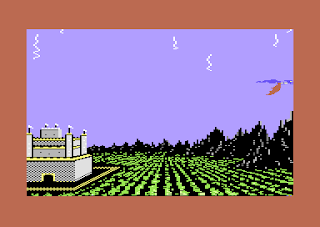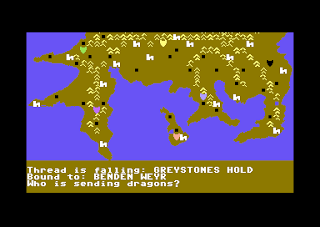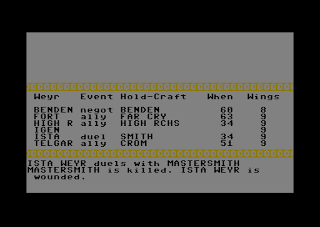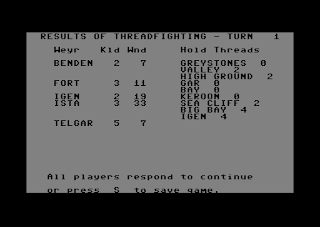Name:Dragonriders of Pern
Number:162
Year:1983
Publisher:Epyx
Developer:The Connelly Group
Genre:Side-Scroller/Strategy
Difficulty:3/5
Time:3 hours
Won:Yes (58W/56L)
The Dragonriders of Pern series is one of those series I must admit to having no familiarity with. I have a spotty reading of sci-fi and fantasy canon, and Anne McCaffrey's work is one of those missing spots. I even have one of the early books I picked up...somewhere, probably for a small sum of money.
Its just a series about people riding dragons, and fighting each other, right? Wrong, this is a science fiction series masquerading as a fantasy series. As the introduction to Dragonflight tells us, Pern is not the native home of humanity in this universe. Instead, its the colonized planet of a group of people who desired to return to a simpler life. Pern has no resources to speak of, its only plus side is its a green planet capable of supporting human life. This is not reason enough to care in the Pern universe, which I find interesting.
Pern is cut off from the rest of humanity thanks to a surprise from a wandering planet trapped in the orbit of Pern's star. A red planet, containing a lifeform dubbed the Thread. The Thread eats a cow in seconds, and is incredibly hostile to other life. The colonists fend off the Thread, but the cost is high. Realizing the gravity of the situation, they take advantage of their advanced genetic engineering to create dragons from local lifeforms. They are to bond with humans who have high empathy and innate telepathy. Also, dragons can teleport apparently.
So over the centuries they build up a medieval lifestyle, forgetting that any life exists beyond their planet and that of the red planet. Dragonriders become knights, and society revolves around ensuring they can defeat the Thread. The sort of rulers are called Weyrs, who get tithes from the everyone else, since they can't exactly dedicate time to something other than thread. You've got things like guilds called craftshalls, led by master craftsmen. Craftshalls are at least in theory supposed to give goods and services neutrally. Then there are various other holds of gradually decreasing holds.
Oh, yeah, holds. Because there's a limited area the dragons can defend, people are limited to various holds. These are carved out of solid rock and metal, a rare occurrence thanks to the planet being chosen for its limited resources. (apparently that extends even to iron) They do this during the Long Intervals. A 200 year period of peace in which no Thread falls, as the Thread falls regularly during a 50 year period. The first novel starts with a period of peace nearly over, but uh-oh, people have started to believe that the Thread is a myth.
Unfortunately, there's only one Weyr left, and a scant 200 dragons. Humans are more numerous compared to the days of old when there were six Weyrs, so they're really in a bad place. Even the discovery of a woman who was the hidden child of some noble bloodline bonding with the new queen dragon doesn't help. (queen dragons are the only ones who can lay eggs, this is incredibly important, both the dragon and her bond) But the woman and her dragon can travel through time to the point where the old Weyrs disappeared and all is well.
If this sounds like a lot of backstory. There are ten pages of this backstory in the third novel, and I'm not even getting into the plot of the second novel! (this all seems to be in the manual's backstory too) The second novel gets into the politics of the setting. Especially now that a bunch of people from the past are clashing with modern, liberal craftsmen who are still getting over their belief that the Thread was a myth. They resettle the southern continent, which was left because it was unstable. They find fire lizards, which are like dragons, and ground grubs which undo the damage caused by the Thread in the soil.
Pern is credited with rehabilitating dragons in the eye of pop culture, something I can't rightly comprehend considering what I just read. Its easy to make a cop out and say this is Twilight for boomers, but the twists this story takes make Twilight look subdued in comparison. Pern is also better written, at least when you get past how incredibly dense it is. Its only natural that someone would make a video game about it, since it was apparently a huge deal back then. The game takes place around the second novel. Political intrigue between the old Weyrs and the modern, liberal lords of the holds. Fire lizards and the southern continent are discovered during play.
You are given a variety of options, but the most important part is game mode. You have regular, no thread fighting and thread fighting practice. No thread fighting just makes the thread fighting automatic. So I guess I better talk about the thread fighting from the practice mode.
Thread fighting is one of the most brilliant bits of combat I have ever encountered in a game. The sheer tactical depth boggles belief. The adrenaline-pumping action leaves you on the edge of your seat as you duck and weave in and out of the falling threads, burning as many as you can. You can hear the screams of the men below you as they're ripped apart by the threads you fail to fell, urging you to fight better...
...which is what they would have liked people to say.
 |
| This is the only screenshot I took of the action game, befitting that there really isn't anything worth seeing |
In practice, the fighting is a bizarre trifecta of simplicity, bad controls and being too easy. Thread fighting has a depth option, which before you understand what it means, you'll be using it with one, and dying thanks to the weird controls. You attack with the fire button, and move up and down with up and down on the joystick. Left and right, meanwhile, change what direction you're going, left, right, inward and outward. This makes turning around very awkward, but thankfully the screen wraps. This is about the only praise-worthy decision the game offers. Finally, by pressing the space bar, you teleport, which you should be doing after getting hit by the thread, lest you die. The only sound is that of your fireballs.
As you can see from the video, the game is easy once you get this down. Laughably so. Depth makes the controls less bad, but its a really slow process moving from the different depths. There's also not a good difference between the thread at the two deeper depths, one thread just feels slightly longer than the other. It does feel complete compared to lower depths, but there's seemingly no reason to select a higher depth. Its fun at first, but rapidly it becomes just as interesting as the lower depths.
Before I talk about the strategy section, I'm going to point out that The Wargaming Scribe is also going to be covering this. As he knows more about strategy games than I, I'm sure his coverage will be considerably more in-depth than mine. I'm not sure the game really deserves all this extensive coverage, but its too late now.
There are 6 Weyrs, of which 4 may be player controlled. The objective is to be the first to get to 20 Victory Points before 20 holds become infested by the thread. To get Victory Points, a Weyr needs to enter into an alliance with a lord of a hold (2 VP) or craftsmaster (1 VP). You select the length of the game in turns/years, each of which consists of 240 or so days.
 |
| Strongest supporter might not mean much, I've seen them have an attitude of indifferent despite being there |
So let's look at the obvious problem. The way the strategy game controls. I've played a lot of strategy games. I'm not very good at them, but that's neither here nor there. Strategy games have learning curves, even in modern strategy games. Modern games generally don't shorten this, as their benefits in easier controls and tooltips don't necessarily come with easier mechanics or GUIs. To say nothing of games getting more complex. The problem with Dragonriders is that the system is incredibly simple, its just presented in such a way that makes it awful.
 |
| I'm sure there was a reason this happens, but it really just seems random |
This game is played in real time, you set the speed at the start. From slow to lightning fast. This, I guess, was done because its a strategy game for action players. Who I'm sure already left when they realized how absolutely boring the action game was. When you press your key or joystick button, you can select one of eight options. But since you don't know what any of the rulers feelings are, you have to select description. Because every time you do this the game stops for a moment, this ruins what little momentum the game has.
 |
| Crom is apparently a coal mining town, though I believe its food for the dragons here |
You have to mentally figure out your plan of attack, and only menus stop the game. Meaning looking at the description of a lord happens while actions are going on. Usually, pressing an action button stops the game before entering a menu. In a multiplayer game this might be something of an advantage, since a friend can't mess you up with information you wanted to know. Although now he too, knows the info you wanted and might just try to take the prize first.
Negotiating with rulers seems to primarily rely on the right attitude from yourself, along with potentially a guildsmaster offering assistance. Once I got past my initial test runs, I figured that getting into an alliance with the Harper's Guild would be best, because he tends to work best with improving relations. All you can do after performing an action is wait. You can only do one action at a time. You get two events you can use to improve relations with multiple people, dragon hatching and wedding. The former happens with some regularity, while the latter only happens occasionally. Dragon hatching only appeals to those that like dragons and I'm not quite sure about the latter. In either event, you want to strategize your time so that you aren't wasting time approaching people for either that long ahead. |
| Shields are Weyrs, blocks are minor holds and the white h shapes are major holds |
Eventually you get the results of your negotiation back, and if you think you've gotten enough done you can try for an alliance. This seems kind of random at times, but I note you need to have a successful tone and to be held in very high regard. That seems to work most of the time. Even against lords allied to other Weyrs. Yeah, you can do that, and so can others. Though I note that the AI tends to not go for yours.
 |
| I'm never even sure why other Weyrs duel, it just happens |
In-between these, random events happen. Someone dies, someone finds a clutch of fire lizard eggs. My least favorite, because the game always directed it against me, someone decries you, which has a pretty noticeable effect on reputation. Meanwhile, the events that deal with how many dragons and dragonriders you have seem to have more vague effects, even as exact numbers are given.
 |
| This is the end of the first turn, because no holds are infested |
After failing to make any progress whatsoever, a thought occurred to me. An evil thought. Rather than being self-interested in my own holds, I'm going to be aggressive. I'm going to sent my wings to the holds the other Weyrs are going after, and I'm not going to kill a single thread. I'm just going to let it fall. In a way, this tactic adds some depth to MP. (the AI is too stupid to see what you're doing) Mutually assured destruction, you don't sabotage my holds, I don't sabotage your holds. At least I think so. This is what you get for not including dealing with the setting's big enemy as part of your victory condition. I note its more fun to dodge the threads than it is to fight them.
Of course this more or less seals that I'm not getting in an alliance with the holds I do this too, but considering they'll be not complaining about much in a few years it seems a small issue. The guy I was courting didn't seem that ticked off at me. But something weird happens, and I don't know why. One of the holds I do believe I was letting thread fall on suddenly decided I was a great guy. Huh? Both in game and out, my atrocities broke him.
Unfortunately, this plan doesn't work, I end up losing 5 to 9, but that's just because I only played 3 turns. Though, I think this is a better tactic for the long game. As I'm not sure the overall effects of thread fighting, I decide for my next game to do a little test. What happens if I do what I'm doing here, but instead of using minimal wings to not fight the thread, I maximize my coverage of thread fighting?
No, if anything, I do worse in the long term, because somehow the opinions of every towards me are constantly falling. I think I discover why though, it turns out that despite killing every single thread on-screen, because I've been sending one wing of dragons, they've still been getting through in some holds. Ouch. I technically win this one, by number of victory points even if the game says I don't. So...the actual idea is to strategize which holds I defend so I can form alliances better and hoping the game doesn't decide to let too many through.
This basically makes actually getting anywhere near the maximum possible length impossible, unless you play as 4 Weyrs. Four people are not getting together to play this for 99 in-game years. Not unless its a Desert Bus for Hope kind of situation. I feel like there are better strategy games for that kind of torture anyway. It does reveal that my other plan isn't going to work unless I was about to lose anyways. That's starting to feel less like an aspect of the game that matters and more like an aspect of the game they hastily tacked on. Threads just don't matter until everyone loses the game.
 |
| Did Telgar lose men despite not contributing anything? Weird |
 |
| There are holds sharing the same name as all the Weyrs, hence how Ista is holding a wedding at a different Weyr |
And at the end of the year I'm now in the lead, with two holds and one craftsmaster. I see that there are only two thread infested holds now. Do the things the game says matter matter in this game? Do words have meaning here? I don't grok it. 12 threads get through this turn, four from me, 10 from Ista Weyr, because they really screwed up, actually losing a significant number of dragonriders. I still have no idea of any logic in this game's decisions regarding thread, because I repeat, I fight perfectly.
I start off the third turn trying to ally myself with the Master Farmer...and then I see Lord Rautha die while also starting a duel against the Master Harper. Nice, that's great, he's trying to screw with my allies while I myself basically have no option of retaliation other than dueling him again. Not that it matters, since both end up wounding themselves. At least Lord Rautha is going to be out of commission for most of the year. And that Lord conclave happens again. Still I make the most of the interaction, getting the Master Smith too. A lot of people tend to be more happy to see me this game, so I guess my strategy actually is working?
Still, I end up with 11 points, far ahead of everyone else. And there are 3 infected holds. So ten thread let through equals an infected hold? Seven threads? Unfortunately, I only protected one hold this turn, since I anticipated more. Instead the AI lets through a ton, 38. They're not trying my nuclear strategy, because they lost dragons in the fight.
 |
| As stupid as this sounds out of context, in-story its a creature that protects the soil against the thread |
 |
| Someone really didn't think this through |
...not that any of that mattered too much, as my idea of a long game was apparently 4 turns. One might say that I got lucky, but this was feeling like a beatdown they were never going to recover from. Maybe I lose one and another guy gets another. So what? I'll just keep plucking away at one guy at a time before regaining my place.
Weapons:
It is nice that you can aim the fireballs to a certain degree. 1/10
Enemies:
This is curious because the two different modes of the game have vastly different objectives. The thread is a joke the game glosses over, while the other Weyrs are worse at this game than I am, somehow. Its at least interesting in that any lord not another Weyr can be won over to your side. 2/10
Non-Enemies:
...but at the same time allies in the strategic game basically only ever contribute victory points and maybe help with negotiations. I never thought I'd be sick to be negotiating in a supposedly action game, but here were are. 1/10
Levels:
I don't really think this qualifies here, its not what they were trying to do, is it? 0/10
Player Agency:
The combat section generally works, if a little confusing at first. The strategy game section also works, except it feels like a struggle to get anything done. 2/10
Interactivity:
None.
Atmosphere:
There's a distinct C64 children's game vibe to the game. That picture book-esque game where it tries to paint itself as a fantasy romp...but its a bit miss whenever you're waiting for something to happen. 2/10
Graphics:
There's not a lot of real effort applied here, but I like the places they tried. The combat background looks nice and the animation is well done. 2/10
Story:
All the words I wrote regarding the story don't matter, all the story of the setting basically doesn't matter. 0/10
Sound/Music:
A few simple sound effects. I like the musical cues, but I feel like they're preventing me from playing music during this. 1/10
Subtracting one for not being a good combination of strategy and action, that's 10.
This isn't good as an action game. It also isn't good as a strategy game. Its just not good. The action game is simplistic bordering on being a programmer's first action game; The strategy game has a desire to over complicate simple matters in a way that makes it all annoying. Further, it feels like you're missing quite a lot of possible actions, while those related to events are confusing to figure out.
I think the problem this game has is that neither element of the game is all that connected to the other element. Its possible for a game to be an action/strategy hybrid, but the combination has to let a player lean on one over the other if they so desire. No amount of skill at one aspect is going to help you with the other. I struggle to think of a proper title, but Mount and Blade works to this somewhat. This is just a stitched together monster. Its a decent enough distraction for me, compared to some of the other titles from 1983, but if you actually owned this then, I can see this as being disappointing. Doubly so if you actually liked the books.











No comments:
Post a Comment